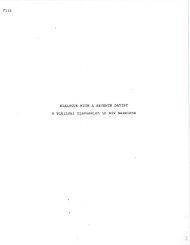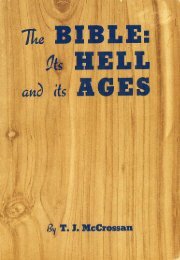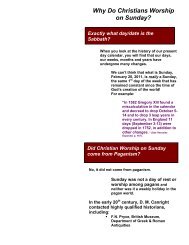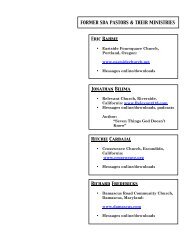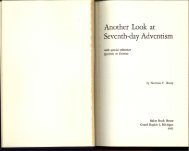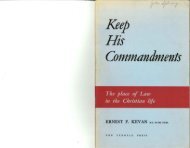Discovering the New Covenant by Greg Taylor - exAdventist Outreach
Discovering the New Covenant by Greg Taylor - exAdventist Outreach
Discovering the New Covenant by Greg Taylor - exAdventist Outreach
You also want an ePaper? Increase the reach of your titles
YUMPU automatically turns print PDFs into web optimized ePapers that Google loves.
THE SABBATH IN THE GOSPELS<br />
of time. But <strong>the</strong> word “chairos” is a word used for<br />
opportune time. It could more accurately be translated “at<br />
that moment of opportunity,” or “at that teachable<br />
moment.” Jesus leads his disciples through a grain field<br />
knowing <strong>the</strong>ir usual habit of eating grain when hungry to<br />
set up this teachable moment. It is in this context that Jesus<br />
responds to <strong>the</strong> religious leaders’ accusations with some<br />
fascinating teaching.<br />
Notice <strong>the</strong> following points that Jesus makes as His<br />
disciples get stopped <strong>by</strong> <strong>the</strong> religious patrol for working on<br />
<strong>the</strong> Sabbath. This was not an infraction of <strong>the</strong> Mosaic code,<br />
only of some of <strong>the</strong> Rabbinic traditions, but it is interesting<br />
to see how Jesus answers <strong>the</strong> accusations. First He tells <strong>the</strong><br />
story of David and how he, <strong>the</strong> anointed king to be, asked<br />
for showbread to eat from <strong>the</strong> sanctuary. This was not a<br />
lawful thing to do, but since he was on king’s business he<br />
did so without being guilty. The question I asked myself<br />
was, “What type of law was David breaking? Was it <strong>the</strong><br />
moral or ceremonial law?” Was this law that David broke<br />
of <strong>the</strong> type of law that had eternal moral value, or was it of<br />
<strong>the</strong> category of specific temporary religious significance? It<br />
was <strong>the</strong> temporary ceremonial law of course. David was not<br />
exempt from moral laws. We know that when he broke <strong>the</strong><br />
seventh commandment and committed adultery with<br />
Bathsheba <strong>the</strong>re was a severe price to pay.<br />
Next, notice in verse 5, Jesus reminds <strong>the</strong> Pharisees<br />
that <strong>the</strong> priests in <strong>the</strong> temple can break <strong>the</strong> Sabbath while<br />
doing <strong>the</strong>ir priestly duties. The priests have an exemption<br />
from <strong>the</strong> Sabbath law while carrying out religious<br />
functions. Now I asked myself again, under which category<br />
of commandments does this priestly office fall? The<br />
priestly system is clearly under <strong>the</strong> ceremonial system. It<br />
was part of <strong>the</strong> specific religious system of <strong>the</strong> Old<br />
<strong>Covenant</strong>. Were <strong>the</strong> priests exempt from <strong>the</strong> moral<br />
commands? Could <strong>the</strong>y lie, cheat, steal, commit adultery?<br />
No, of course <strong>the</strong>y could not. I remembered that this same<br />
basic argument was used <strong>by</strong> Jesus in John 7:22-23. There<br />
105



